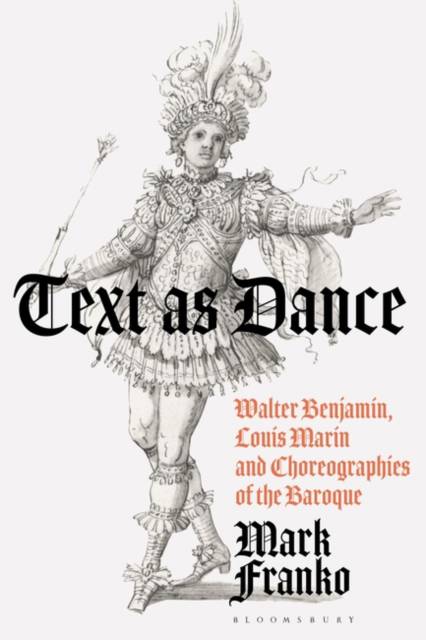
- Afhalen na 1 uur in een winkel met voorraad
- Gratis thuislevering in België vanaf € 30
- Ruim aanbod met 7 miljoen producten
- Afhalen na 1 uur in een winkel met voorraad
- Gratis thuislevering in België vanaf € 30
- Ruim aanbod met 7 miljoen producten
Zoeken
Text as Dance
Walter Benjamin, Louis Marin and Choreographies of the Baroque
Mark Franko
Hardcover | Engels
€ 195,45
+ 390 punten
Omschrijving
This book offers a groundbreaking investigation into issues of gender, power and the representation of sovereignty in French Baroque court ballet - and in today's performances that recall them.
Mark Franko uses powerful interpretive tools derived from historiography and critical theory, especially the work of German-Jewish philosopher Walter Benjamin, to offer the reader both a historical and a theoretical interpretation of this genre of dance in France (c. 1615-1654), as well as its aftermath and legacy today. Through doing so, he reaches conclusions about how sovereignty and power were both perceived by viewers at the time and how they were represented through dance, given that it was the noble class who devised and performed court ballets. He enquires into the role of choreography and theatricality as potentially critical forces operating at the heart of sovereignty. Franko places the work of Louis Marin on power, representation and movement in French Baroque painting and performance in juxtaposition to that of Benjamin on theater. Other historians whose work is prominent in this study are Ernst Kantorowicz, Michel Foucault and José Antonio Maravall. With wide breadth in the work of historians, philosophers, political scientists, critical theorists, musicologists and dance historians, this is the culmination of a career's-worth of scholarship and research in the field.Specificaties
Betrokkenen
- Auteur(s):
- Uitgeverij:
Inhoud
- Aantal bladzijden:
- 256
- Taal:
- Engels
Eigenschappen
- Productcode (EAN):
- 9781350236882
- Verschijningsdatum:
- 23/01/2025
- Uitvoering:
- Hardcover
- Formaat:
- Genaaid
- Afmetingen:
- 140 mm x 216 mm
- Gewicht:
- 439 g

Alleen bij Standaard Boekhandel
+ 390 punten op je klantenkaart van Standaard Boekhandel
Beoordelingen
We publiceren alleen reviews die voldoen aan de voorwaarden voor reviews. Bekijk onze voorwaarden voor reviews.











